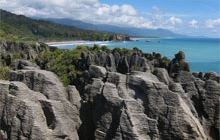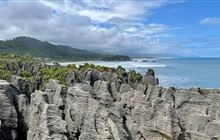Dolomite Point Redevelopment Project
Introduction
This redevelopment project seeks to uphold the natural and cultural significance and character of the spectacular Punakaiki area.Its anchor piece is a new Experience Centre celebrating and telling the stories of the area’s people, striking geology, unique wildlife and cultural heritage.
The redevelopment is also addressing connectivity and pedestrian safety issues at Dolomite Point.
The project
Dolomite Point is a limestone promontory at Punakaiki on the West Coast of the South Island. It is home to renown pancake-shaped rock formations, blowholes and surge pools.
The tiny township of Punakaiki is the gateway to the Paparoa National Park and the Paparoa Track Great Walk.
Through the Dolomite Point Redevelopment Project, DOC is extensively upgrading key facilities and infrastructure at what is one of the most visited sites on the West Coast. A key focus of the work is establishing a cultural footprint for Te Rūnanga o Ngāti Waewae so the Ngāi Tahu hapu is able to share its stories with visitors.
The project seeks to uphold the natural and cultural significance and character of the spectacular Punakaiki area. The anchor piece is a striking new Experience Centre, built largely from wood with a green/living roof. Ngāti Waewae owns and operates the building. DOC’s Paparoa National Park Visitor Centre has moved from its old premises and provides its free visitor information services from within the new Centre.
Work on the Experience Centre began in May 2022 as part of the first stage of the main construction. Other work in this stage included the creation of safer and improved pedestrian access to the Pancake Rocks and new toilets.
Project work completed includes extensions and improvements to the car park north of the commercial precinct at Dolomite Point and a shared pedestrian/cycle pathway connecting Punakaiki. This runs about 4.2 km from Truman Track in the north to the Punakaiki River in the south. It enables residents and visitors to walk or cycle to sites and services, reducing the need for vehicle use. The southern end of the pathway joins up with the cyclist entrance to, and/or exit from, the Paparoa Track Great Walk.
The major part of the second phase is a multi-media visitor exhibition building connected to the Experience Centre by a pedestrian link bridge. This is scheduled to open for the 2024/25 summer. The second phase also includes:
- a new water treatment plant to support visitor facilities
- off-road pedestrian/cycle path connections to complete the Punakaiki pathway built in the first phase
- landscaping work in the pedestrian area, and
- a nature walk and viewing platform on the hillside behind the businesses at Dolomite Point.
Dolomite Point
Dolomite Point is surrounded to the east by regenerating coastal forest, including abundant nīkau palms, with the Punakaiki Marine Reserve to the west. Numerous threatened bird species are present in the area. It is an overhead flight corridor for the Westland petrel (tāiko) whose sole mainland breeding colony is just south of Punakaiki.
Coastal and inland trails on the West Coast/Te Tai Poutini were well known to Māori. The old trail along the Punakaiki coastline was used to transport carved pounamu and raw stone for trading. It also provided access to matā, the diamond-hard flints needed to drill holes in pounamu, found at Pahautane a few kilometres north of Punakaiki.
Some sections of the Paparoa Track, which runs from Punakaiki to Blackball, follow pack tracks built by gold miners during the rushes of the latter part of the nineteenth century.
Background
Punakaiki is an iconic visitor destination and gateway to the Paparoa National Park.
In 2008, 213,000 people visited the Pancake Rocks walkway at Dolomite Point. This increased to 511,000 in 2018, placing significant pressures on the dated visitor and traffic-related infrastructure at the site.
DOC is leading the project on behalf of key partners including Te Rūnanga o Ngāti Waewae and the Ministry of Business, Innovation and Employment. Other key stakeholders include the Punakaiki community, Waka Kotahi, Buller District Council, and Development West Coast.
A concept plan for the redevelopment of Dolomite Point was finalised in October 2018. First phase funding was from the Provincial Growth Fund $25.6 million and DOC, $2.15 million.
In May 2023 the Government announced additional funding of $14,920,000 for the work
Partnership
Partnership between the Crown and iwi is at the heart of the Project.
Ngāti Waewae will own and manage the new Dolomite Point Experience Centre. In so doing it will re-establish a cultural footprint for mana whenua at the site.
The aim is for Ngāti Waewae to be able to host manuhiri (visitors) and connect them with the natural and cultural significance of the area.
DOC is co-habiting the new centre with Ngāti Waewae and continuing to provide its Paparoa National Park visitor information service.
The approach ensures that visitors enjoy a complete and holistic experience and can connect with Māori culture and heritage at site, an aspect which has been missing.
Consultation process
There has been extensive stakeholder engagement to inform project design. Community meetings have been held during all design steps and formal feedback collated and factored into the design as it evolved.
Ngāti Waewae has been engaged throughout the project on a collaborative basis.
Timing
Main construction began mid-2022. The entire project will be completed in November 2024.
Media releases
- Punakaiki project boosts local economy, 5 October 2022
- Dolomite Point ceremony 31 May 2022
- Dolomite Point work starting 11 April 2022
- Community celebrates project pathway October 2021
- Punakaiki project takes next step 2 August 2021
- Experience centre design takes shape 14 July 2020
- Designer engaged for Dolomite Point Redevelopment Project – Punakaiki 28 February 2020
- Proposals sought for final design of Dolomite Point Redevelopment Project 9 October 2019


